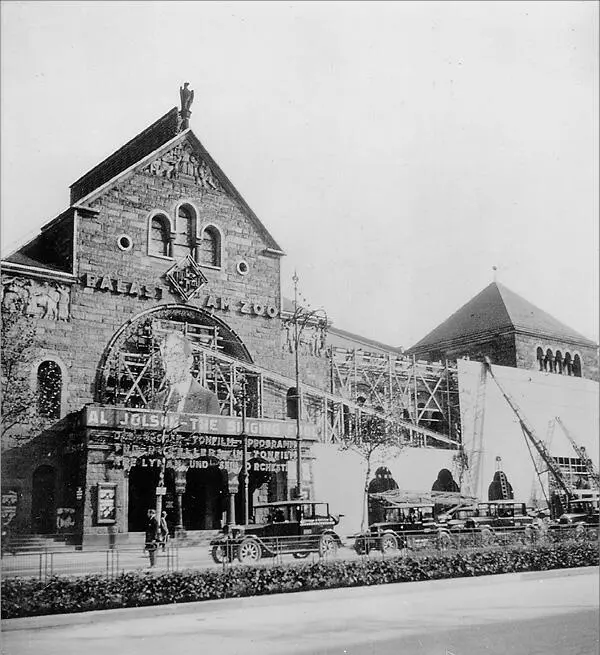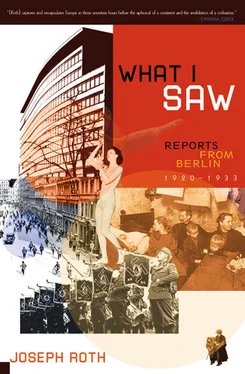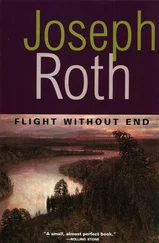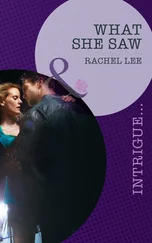It’s past midnight; a sleepy little girl, some sports fan’s offspring, is crying in a whiny little voice, her wailing has trouble clearing a little path for itself through the dirty airwaves:* A minor acoustic tragedy is at hand. A drunkard is reeling around in the background, and his tongue struggles with the language, obstinately and bitterly, for a whole hour. People tell him to pipe down. He can’t. Whatever is bothering him has to be told. A few are asleep and snoring. Their noses rattle loudly and rhythmically, like little carts laden with old iron, on narrow tracks. In balconies and boxes bald heads gleam like round mirrors. What, precisely, is the relationship between capital and hair loss?
Dawn is about to break. No inkling of the new day will be seen in here. Here the icy suns of the underworld will continue to shine, the wheels will turn, the drunks will sober up, the sleepers awaken — while, outside, the world will shake off the night and the fog will slink away from the fields, and the wintry sun, red and slow, will begin its journey. The leftovers of four days and a hundred families waft through the arena.
Outside the drivers are asleep. A part of the rain of money that’s pouring down within will drip onto them as well. They’ve been waiting for it. One lot lives off the other. That’s the way it goes.
Frankfurter Zeitung, January 20, 1925
27. The Conversion of a Sinner in Berlin’s UFA Palace* (1925)

In the newspapers, but also on a hundred bright and arresting posters, I saw advertisements for America’s funniest comedy, guaranteeing me a rip-roaring evening’s entertainment. There was a gold-braided porter standing in front of the three lofty gates, and funny announcements of the film and a very famous clown’s face in red and yellow. A great swarm of happy people pressed up to the box office and bought tickets for themselves. Nothing betrayed the deep seriousness that awaited me inside the theater, and I had no idea what shocks my poor impious soul would encounter there. .
I had long ago set aside the habit of seeing in every Berlin mosque a Muhammadan house of worship. I knew that the mosques here are movie theaters, and the Orient is a movie. Many years ago, once, in the days when I was still a believer, I wanted to attend an early mass. I stepped into the church — and found myself in a railway station. Later on I learned that architectural style counts for nothing, and that it is in red-brick warehouses equipped with lightning conductors that the altar is set up, and God’s word is heard. .
But this time was different:
I was sitting in the third row in front of the greenvelvet curtain. Suddenly the hall darkened, the curtain slowly parted, and a mysterious light that could not have been created by God, and that nature couldn’t manage in a thousand years, ran in soft rivulets over the silvery walls of the hall and down the front of the stage. It was as though a waterfall had been slowly tamed — housetrained — in the course of many years and then applied to the walls of this palace, to run down them slowly and civilly, made to answer to human needs, elemental forces with pretty manners, forces of nature that had had a good talking-to. This illumination was compounded of dawn light and evening red, of empyrean clarity and infernal haze, of big-city air and sylvan green, of moonshine and midnight sun. Things that nature can only accomplish separately or in succession, were here encompassed in the one hall and in the space of one minute. And thus it was made clear to me that an unknown and powerful godhead was here at play, if not in earnest. There was not room to fall to my knees, because we were sitting packed together, but, if it’s possible to say so: It was as though my knees fell to their knees. .
All around me, so far as one can tell faith from people’s faces, were members of various creeds. All were moved. And when a young black man started to pray at an organ, and the mighty sounds of the divine instrument filled the opened hearts of those present, it grew so quiet in the hall that in all the building one could hear nothing but the breathing of the people, almost as at a medical examination, on the order: Breathe deeply!. .
Then a little silver bell tinkled, and out of habit I lowered my head, and, like a small boy, peeked between my fingers. I saw the curtain break in two, and from the opening black men dripped one by one down the steps off the stage, men bearing musical instruments. Last of all, in a great rush, like a teacher entering a classroom, a slender bespectacled young man jumped into the orchestra pit, his long hair flying in front of him in the wind he himself had caused.
He was the conductor. .
And it was wonderful to behold him as he gesticulated wildly with his arms, how he fenced with the whole orchestra with his swift baton, nettled the violins, and elicited stern growls of protest from the double bass, shook the sails of the timpani, and drew silvery snakes from the flutes — and, lo, the name of it was Offenbach.
As the music weighed light or heavy, the projection changed its colors from blue to red to yellow, the musicians were ghosts, and the conductor’s hair sometimes burned with a sacred fire up to the ceiling. The domestic waterfalls still flowed. And finally our reverence discharged itself in violent applause, and those who applauded the loudest were the agnostics. We all confessed the will of a supernatural power, a metaphysical theater management, a heavenly industry. .
And then the projectionist began to officiate at the film by Harold Lloyd.* But who was there who could laugh? No mirth shook my diaphragm. My thoughts were on death, the grave, and the hereafter. And even as the man on the screen was performing some wonderful comic gag, I decided I would dedicate the rest of my life to God, and become a hermit.
At the end of the show I quickly rushed away into a deep dark forest, which I have not left since. .
Frankfurter Zeitung, November 19, 1925
28. The Berlin Pleasure Industry (1930)

Sometimes, in a fit of incurable melancholy, I go into one of the standard Berlin nightclubs, not to cheer myself up, you understand, but to take malicious pleasure at the phenomenon of so much industrialized merriment. Any anxiety that it might be my advancing years that make me incapable of enjoying myself is quickly allayed by my perfectly objective view of the indescribable monotony of international nightlife. The entire mechanism by which fun is produced and communicated these days seems ever more simplistic and transparent the more human nature is forced to import entertainment from outside. It’s as though that crude force that seems capable almost of making something out of nothing had now been tried out on people’s spirits and feelings, in the attempt to create capital from our inborn inclination and need for amusement. And it’s as though this crude and homogenized purveying of fun had also succeeded in producing in all the cities of the world one standardized type of night owl, with the same set of strictly normed and basic requirements, which can be satisfied in accordance with one or two simple rules. At around two o’clock at night, anyway, the image given by a bar, a “luxury spot,” “a dance hall,” is one and the same in Berlin, Paris, Marseilles, and Cairo: the perfumed smoke of international “luxury brand” cigarettes hangs under the ceiling like a sort of gaseous lining or underpinning. The soft reddish illumination works not to create light but to suppress it. The glowing colors of the cocktails, mixed in accordance with international recipes, evoke semiprecious stones in liquid form and are poured into curved glass bowls about the size of a coconut half. Stiff yellow bundles of straws stick out of metal holders, the only remote memory of a long-gone rustic period of human history.
Читать дальше














